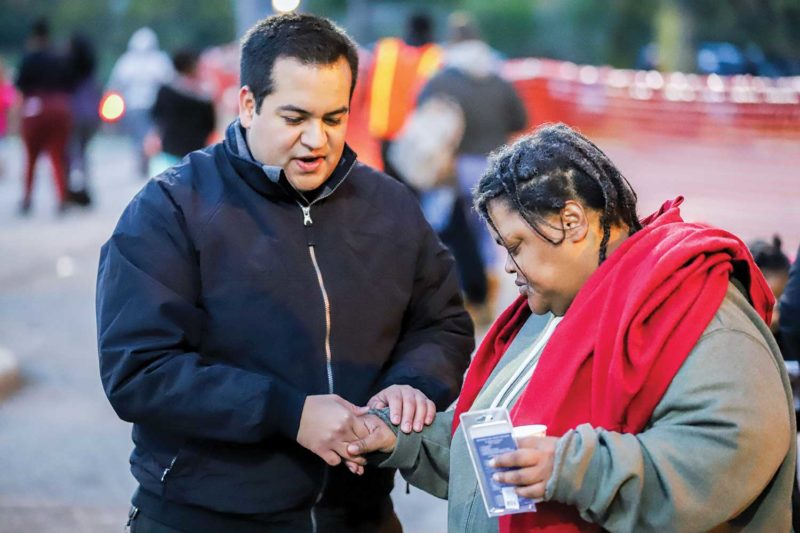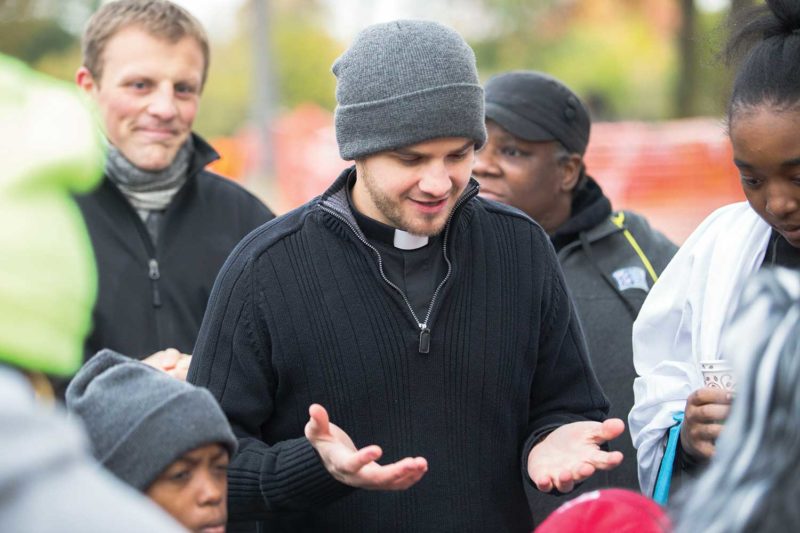
When the seminary was refounded by Cardinal Szoka in 1988, the refounding was undertaken with a strong commitment to the city of Detroit and with an awareness of the particular needs and challenges that come along with life in the city. At that time, the wounds of the 1967 riots were still raw, and even today, fifty years later, some of the scars, visible and invisible, yet remain.
As much as Sacred Heart has been a blessing to the neighborhood, the neighborhood has been a blessing to the seminary and to its mission of forming heralds for the New Evangelization. The location of the seminary provides a fertile ground for the growth and development of pastoral gifts needed for priestly ministry in any context. As such, priestly formation at Sacred Heart has benefitted from being able to unfold in the midst of many who present the face of the suffering Christ to the seminarians.
Ministry to the Marginalized
To order the work that needs to be done in seminary formation, the Church considers priestly formation under four headings or dimensions: human, spiritual, intellectual, and pastoral. The most obvious advantage of the seminary’s setting appears in the pastoral dimension.
The fifth edition of the U.S. Conference of Catholic Bishops’ Program for Priestly Formation (PPF) states under the heading of “Pastoral Formation”:
If seminarians are to be formed after the model of Jesus, the Good Shepherd, who came “to bring glad tidings to the poor,” then they must have sustained contact with those who are privileged in God’s eyes—the poor, the marginalized, the sick, and the suffering. In the course of these encounters, they learn to cultivate a preferential option for the poor. They also need to become aware of the social contexts and structures that can breed injustice as well as ways of promoting more just contexts and structures. (PPF 239)
The seminary’s location provides the “sustained contact” with the poor and marginalized spoken of by the bishops in the Program for Priestly Formation, as seminarians are confronted daily with the material poverty that can be seen in so many areas of the neighborhood. Poverty and marginalization are realities that cannot be ignored when they are writ so large right before our eyes, and the impetus to reach out in Christian charity is readily evoked as a response to such realities.
All that remains, then, is to form the seminarians in the means of accompaniment.
Seeing the Face of Christ

Pastoral formation in the undergraduate seminary program focuses heavily on cultivating in the men a love for the poor and a servant’s heart through the Apostolic Experience Program (AEP). The program is not a formation in problem solving but rather a formation in accompaniment, and the term “Apostolic Experience” is intentionally chosen.
Just as the Apostles were called from their lives and livelihoods to follow the Lord in his poverty, so the seminarians are invited to see the face of Christ in their brothers and sisters on the margins, the peripheries, of society.
Just as the Apostles were not called into a relationship with the Lord in order to resolve the difficulties of this earthly life—the fishermen were not recruited to use their businesses to put a roof over the Lord’s head—so the work of the seminarians in their various ministries is more about encountering Christ than fixing material problems.
The various classes of the undergraduate program work in various ministries, including ministry to the homebound members of the Blessed Sacrament Cathedral parish; teaching basic reading, writing, and mathematics skills at the Dominican Literacy Center; caring for the developmentally disabled at Angels’ Place; and individual counseling at the Crossroads outreach, among others. The work of Sacred Heart’s seminarians at Crossroads exemplifies what AEP as a whole seeks to form in the men.
At Crossroads, the seminarians meet individually with persons who may be dealing with any number of challenges: homelessness, unemployment, transportation problems, hunger, or lack of personal identification needed to obtain further assistance, to name a few. Each person comes with his or her own story, and the seminarians are taught to treat each person as a person, as Christ, and not simply as a “case.”
As the conversation between the seminarian and the person unfolds, often deeper needs are uncovered and greater assistance can be provided, which never could have come about had the seminarian not first learned to see Christ and not a case that needs to be resolved. That ability to see the face of Christ in the poor, though, is first cultivated by what the seminary’s neighborhood can call out of a man: a deep compassion and charity for those most in need.
Simple Men for Service
Many of the seminarians in the college program are from dioceses or places within the Archdiocese of Detroit that do not confront them with the particular needs that can be found in the city itself, yet that certainly does not mean that the pastoral formation that can take place in a poor urban area is for nought. Regardless of the direction that a man’s ministry might take after his ordination, the lessons that he learns at Sacred Heart in the city of Detroit will shape his concern for whatever poverty he may find in the place he serves.
Our location likewise helps to form men who seek out the poor in order to serve them, even in places where they may have become marginalized and invisible. In terms of their spiritual life, men learn here to follow the Lord in his poverty and to integrate poverty and simplicity into their own lives. This formation of simple men for the service of the poor happens not in spite of Sacred Heart’s location but rather because of it.
Recently, one of our sponsoring bishops from a diocese that is largely rural shared his thoughts on our location. When asked why he would send his men to a seminary in such a challenging location and how God’s grace could grow in a man’s life in such a context, he responded, “The location is the grace.”
Indeed, our setting draws great pastoral gifts out of each man formed here and helps him to develop the heart that he will need to be a compassionate servant of the Sacred Heart of our Lord.
Fr. Clint McDonell (Class of 2004, 2008) is director of undergraduate seminarians and assistant professor of theology at Sacred Heart.
